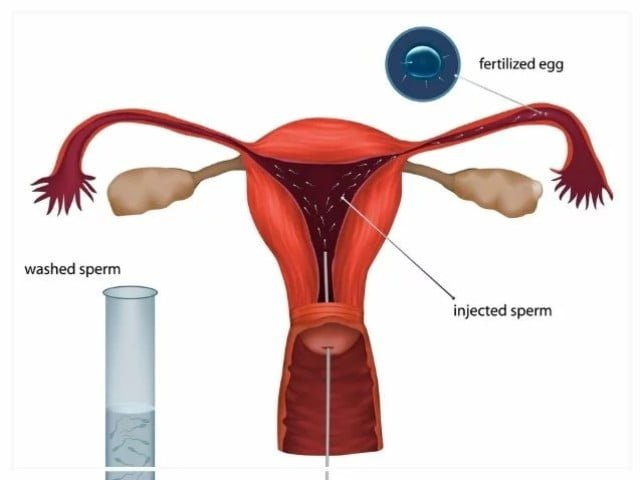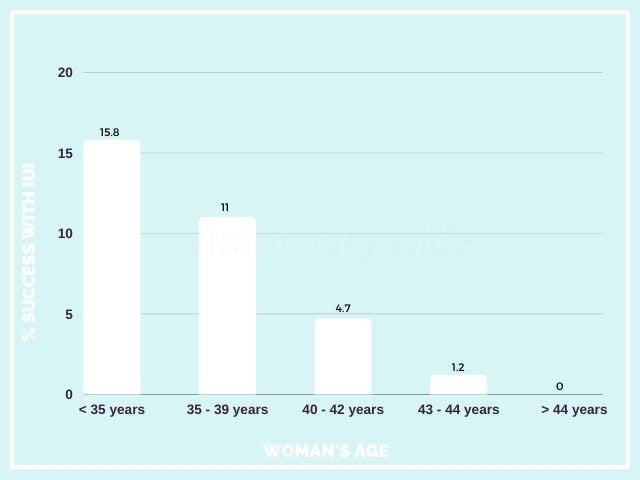Intrauterine insemination (IUI), also known as artificial insemination (AI), is an infertility treatment that involves injecting washed sperm into the woman’s uterus to facilitate fertilization.
Artificial insemination helps in fertilization simply by increasing the number of sperm that reach the fallopian tubes for fertilization of the egg. It increases the chances of fertilization but there is no guarantee that all the added sperm will fertilize the egg.
IUI is usually the first line of ART for couples with unexplained infertility or male factor infertility.

First usage of IUI
Research studies in the early 1980s compared pregnancy rates in women undergoing artificial insemination to those having regular intercourse, while both groups were under fertility therapy.
The women who had AI were found to have higher pregnancy rates and since then, IUIs became popular amongst couples facing infertility.
Is it for us?
IUI is recommended if you have:
- Low sperm count
- Decreased sperm motility
- Ejaculation problems
- Unexplained infertility
- Cervical mucus problems that make it difficult for the sperm to survive
- Cervical scar tissue which may obstruct the sperm from entering the uterus
Artificial insemination may also be helpful if the woman has mild endometriosis or requires donor sperm.
IUI is relatively inexpensive and there is a tendency among people to try it before any other ART procedure. However, unless it is for the above listed reasons, you will be wasting your time money trying a procedure that is not right for you.
Time is of paramount importance as the fertility of a woman declines sharply after mid-30s and you should not waste time trying ineffective therapies in vain. Instead go to a doctor who is able to diagnose your condition well and advise the therapy with best chances of success right away.
IUI is NOT recommended when:
- Both the fallopian tubes are closed or severely damaged
- You have higher degree of endometriosis
- You have a history of pelvic infection
- You have reduced ovarian reserve
- You have higher levels of FSH (day 3)
How is IUI performed?
Essentially, artificial insemination involves these three steps:
- Stimulation: Ovulation stimulation medications are given to help the development of multiple eggs.
- Semen collection & processing: Semen sample is collected and washed to get the sperm concentrated in small volume. Sperm processing can take between 30 and 60 minutes. Semen analysis is done prior to the procedure and the male partner is required to abstain from ejaculation for atleast 3 days to maximize sperm count.
- Injection of the sperm: The highly motile, processed sperm is placed in the uterus using a sterile, flexible catheter.
The sperm injection is timed with the expected ovulation, typically about 24-36 hours after the LH hormone surge. Your doctor may also suggest an HCG trigger injection to avoid the stress of expecting ovulation at a certain time.

The IUI procedure is similar to a pap smear for the woman, and if done rightly, you should not feel any discomfort. You will be allowed to go home the same day, after resting for 30-60 minutes.
Are drugs required for IUI?
Fertility drugs— Clomiphene, letrozole, or GnRH antagonist drugs—are usually given before IUI as pregnancy rates are known to improve when insemination is preceded by administration of drugs.
What are my chances of conceiving with IUI?
Your chances of success with artificial insemination depend upon several factors including:
- The reason for infertility
- Age of the female
- Usage of fertility drugs
According to the American Pregnancy Association, IUI success rates could be as high as 20% per cycle, if you try it each month. But that only depends if all the other factors are favorable.

The Human Fertilisation and Embryology Authority, has published data (depicted in the chart above) that suggests the success rates of IUI with donor sperm as:
- Women < 35 years – 15.8%
- Women 35-39 years – 11%
- Women 40-42 years – 4.7%
- Women 43-44 years – 1.2%
- Women > 44 years – 0%
How many cycles are suggested?
If you have failed three cycles of IUI, a change of treatment plan and IVF is advised.
If the female is over 40 or has a low ovarian reserve, a sooner call for IVF must be taken.
IUI risks
There is little chance of risks and complications with artificial insemination. Bacterial contamination of the semen sample or the catheter may cause an infection in the uterus.
However, if your clinic ensures hygienic practice, this is very rare.
Cost of IUI
Average cost of one cycle of artificial insemination in different parts of the world:
India – $100 – $250
Thailand – $450 – $1,000
Malaysia – $2,000 – $3,500
United Kingdom – $1,000 – $1,800
Australia – $2,000 – $3,500
USA – $800 – $4,000
Mexico – $850 – $1,000
Spain – $650 – $1,500
This does not include the cost of medications. If you want to plan for IUI in India, Thailand, Malaysia, Europe or Mexico, write to us using the form on this page.
References:
http://americanpregnancy.org/infertility/intrauterine-insemination/
